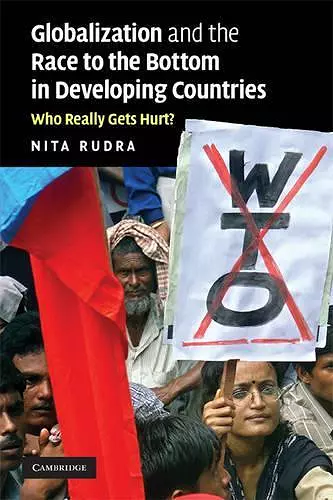Globalization and the Race to the Bottom in Developing Countries
Who Really Gets Hurt?
Format:Paperback
Publisher:Cambridge University Press
Published:25th Sep '08
Currently unavailable, and unfortunately no date known when it will be back
This paperback is available in another edition too:
- Hardback£90.00(9780521886987)

Challenges conventional wisdoms surrounding globalisation's effects on developing countries, suggesting that the real losers are the middle classes.
According to conventional wisdom, globalisation's 'race to the bottom' undercuts welfare protections in developing countries, with the biggest losers being the poor. This study argues for a more complex conceptualisation, noting that it is the middle classes, the real beneficiaries of these welfare systems, who are most affected.The advance of economic globalization has led many academics, policy-makers, and activists to warn that it leads to a 'race to the bottom'. In a world increasingly free of restrictions on trade and capital flows, developing nations that cut public services are risking detrimental effects to the populace. Conventional wisdom suggests that it is the poorer members of these societies who stand to lose the most from these pressures on welfare protections, but this new study argues for a more complex conceptualization of the subject. Nita Rudra demonstrates how and why domestic institutions in developing nations have historically ignored the social needs of the poor; globalization neither takes away nor advances what never existed in the first place. It has been the lower- and upper-middle classes who have benefited the most from welfare systems and, consequently, it is they who are most vulnerable to globalization's race to the bottom.
'An innovative treatment of the 'race to the bottom' question... this book provides a useful corrective to contemporary discussions of globalization, many of which assume that any 'race to the bottom' among developing nations will be detrimental to the poor. It will interest scholars and students of comparative political economy, welfare state policies and economic development.' Layna Mosley, University of North Carolina, Chapel Hill
'Nita Rudra's book sets a new standard for the empirical study of globalization. Based on extensive research and fully informed by theory, the analysis is remarkably sure-handed - mature, nuanced, and ultimately highly illuminating.' Benjamin J. Cohen, University of California, Santa Barbara
'With this very impressive book combining sophisticated quantitative analysis with subtle national case studies, Rudra confirms her place in the vanguard of scholars working on how politics mediates the effects of globalization in the developing world. Her focus on the importance of organized labor-government interactions and on the plight of the middle class outside the OECD is a welcome corrective to the simplistic mud slinging that all too often characterizes the globalization debate.' Geoffrey Garrett, Chief Executive Officer of the United States Studies Centre and Professor of Political Science, University of Sydney
'Nita Rudra makes us think hard not only about the effects of globalization on welfare, but also on the unequal nature of social insurance and services in developing countries. An agenda-setting book.' Stephan Haggard, Graduate School of International Relations and Pacific Studies, University of California, San Diego
'An innovative treatment of the 'race to the bottom' question. Nita Rudra posits that trade openness contributes to downward pressures on developing country welfare state policies. At the same time, however, Rudra demonstrates that the beneficiaries of social policies in developing nations are not, and have not been, the poor. Rather, social policies in developing nations have tended to target the middle and upper classes. As a result, the downward pressures generated by economic globalization are largely irrelevant to the poorest members of developing societies. This book provides a useful corrective to contemporary discussions of globalization, many of which assume that any 'race to the bottom' among developing nations will be detrimental to the poor. It will interest scholars and students of comparative political economy, welfare state policies and economic development.' Layna Mosley, University of North Carolina at Chapel Hill
'Globalization and the Race to the Bottom will help reorient and set the discipline's research agenda on globalization's effects on welfare states in emerging markets. Rudra's thesis - that middle class citizens, and not the poor, are most adversely affected by globalization's influence on domestic welfare institutions - is tightly and persuasively argued. I highly recommend this book.' Dennis Quinn, McDonough School of Business, Georgetown University
'Why is globalization so controversial in the South? This pathbreaking book explains this and much more, and in doing so greatly deepens our knowledge of how the 'race to the bottom' really influences the lives of poor people.' James Robinson, Harvard University
'This is the best study we have to date of the impact of globalization on social welfare arrangements in developing nations. Rudra deploys statistical analyses and country studies to advance an interesting thesis: yes, there is a race to the bottom, but no, the main losers are the middle classes and not the poor. Rudra is surely correct to stress that the fate of the poor remains largely in the hands of domestic institutions.' Dani Rodrik, Harvard University
ISBN: 9780521715034
Dimensions: 228mm x 152mm x 20mm
Weight: 510g
314 pages